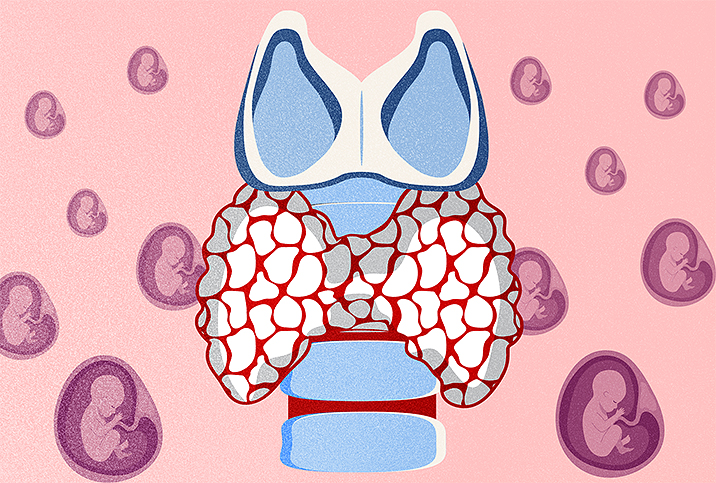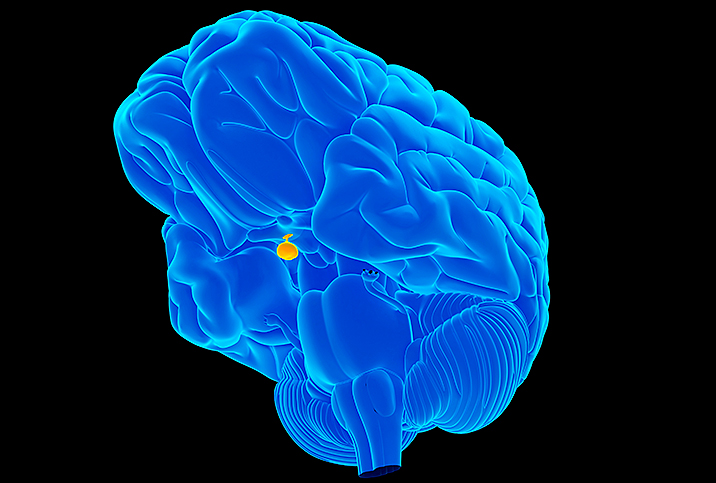An Underactive Thyroid Can Impact Fertility

I was diagnosed with hypothyroidism at age 22, a condition my doctor determined was a result of Hashimoto's thyroiditis. With hypothyroidism (underactive thyroid), the thyroid gland doesn't produce enough of certain crucial hormones. The disease is linked to infertility in some women.
At the time, I wasn't planning on having a baby, but I was still worried about my future. However, my doctor reassured me that most women with hypothyroidism and Hashimoto's can still get pregnant, but emphasized that I needed to routinely test my thyroid stimulating hormone (TSH) and monitor my levels because thyroid function is connected to fertility.
Recently, my partner and I decided to try to have a baby, but nothing happened. Months went by, and the fear I had when I was in my early 20s returned. I hadn't realized how quickly my hormones could shift, but I had made recent lifestyle changes, including weight loss, and this had caused my TSH levels to change, meaning my dose of thyroid hormone (Levothyroxine) needed to decrease.
How does hypothyroidism affect fertility?
For women with low levels of thyroid hormone, ovulation can be difficult. The good news is, you're not alone, and many women with hypothyroidism have successfully gotten pregnant. Brian Levine, M.D., a board-certified reproductive endocrinologist, confirmed that an underactive thyroid is incredibly common.
"Hypothyroidism may prevent the release of the egg from the ovary and cause infertility," explained Jane Frederick, M.D., a board-certified reproductive endocrinologist. "It can also interfere with the development of an embryo (fertilized egg). This increases the risk of miscarriage."
'If a woman is pregnant and the hypothyroidism is not treated, the baby may be born prematurely and consequently have a low birth weight.'
Frederick also noted that if a woman with hypothyroidism does get pregnant and carry to term, her newborn may face certain health issues: "If a woman is pregnant and the hypothyroidism is not treated, the baby may be born prematurely and consequently have a low birth weight."
"Other complications may include preeclampsia, premature separation of the placenta, stillbirth, and even abnormal neuropsychological development in offspring," Levine added.
Treating hypothyroidism
Many women who suffer from hypothyroidism are able to get pregnant by making lifestyle changes and monitoring their thyroid levels.
Routine thyroid hormone screening is extra important during pregnancy. It is essential to communicate with your doctor if you are concerned about your thyroid or have had trouble regulating your thyroid levels in the past, as your doctor may increase the frequency of blood tests.
"Although universal screening is not generally recommended to patients wishing to become pregnant, many internists and OB-GYNs screen patients with a simple blood test. The TSH level should ideally be less than 2.5 mIU/mL," Levine said.
He continued, "Hypothyroidism may seem like a complicated disease, but the truth is, once the patient makes some lifestyle changes and is on the correct dosage of thyroid hormone (Levothyroxine, Synthroid, etc.), vital body functions usually go back to normal."
Lifestyle changes your doctor may recommend include eating a balanced diet, increased exercise, destressing techniques and getting more sleep.
Some women with treated hypothyroidism still fail to conceive and end up seeking infertility treatment, including controlled ovarian hyperstimulation (COH) and in vitro fertilization (IVF). If you've been unable to get pregnant and want to explore other paths to conceive, talk to your doctor about your options.
Exploring my fertility options
Early in my fertility journey, I thought my thyroid disease would be the only issue holding me back from pregnancy. It turns out that it's more complicated than that. Indeed, my TSH was not optimal, and it was quickly corrected with an adjustment to my medication—but I still did not get pregnant.
When we were facing infertility, our doctor began ruling out different possibilities. My sex hormones were normal, and my estrogen was slightly high but not of much concern. The doctor then took a semen analysis from my partner and discovered that our chance of conceiving naturally was close to zero. The only option we have is IVF.
As my partner and I research fertility clinics, I am thankful for the success stories doctors share showcasing couples like us, some even experiencing their first pregnancy in their mid-40s—which is a success story in itself.
While hypothyroidism did not end up being the main deterrent to my fertility, finding out the connection between the two and learning to keep my levels healthy gave me further understanding about my Hashimoto's. If you're struggling to get pregnant, ask your doctor about thyroid hormone screening.




















